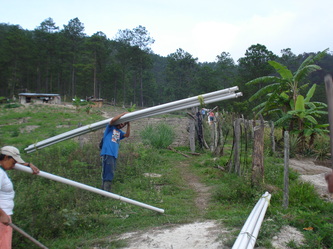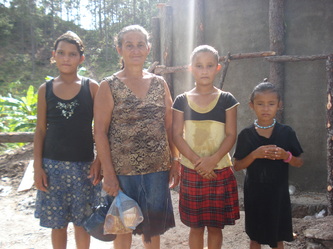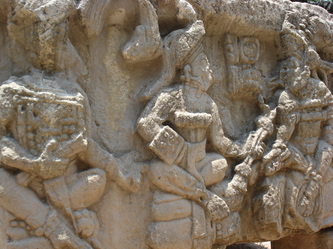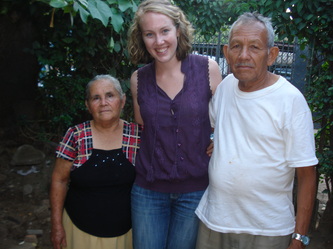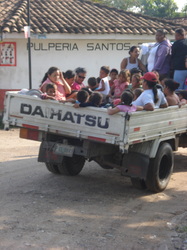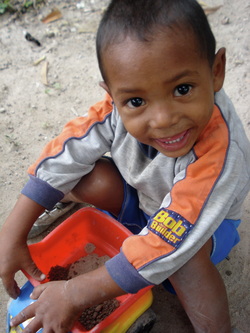Happy Mother's Day! Happy Flag Day! Happy Father's Day! Happy Quebec National Day (Canada)! Happy Memorial Day! Congratulations Andrew on graduating the 8th Grade! ... and today ... Happy Fourth of July! I think those are the landmark dates that have passed since the last time you all heard me on this particular platform. Needless to say, these past two months have been busy. My family visited in May. It was wonderful. I'll be curious to hear Andrew's recollections of the trip in about 5 years or so and also to hear if anything he saw impacted his view of the world, himself, etc. etc. I'm using Andrew in this case as my guinea pig because he's the youngest and most impressionable of the family (Walt's a lost cause). To be honest, I'm proud of my intrepid family. If you don't happen to have a vagabond daughter to be your travel guide in the developing world, one nice way would be to sponsor a child at one of the Our Little Brothers and Sisters orphanages (the home in Honduras is right nearby Talanga) because they welcome visits from individuals who sponsor their children.
At the beginning of June we started the potable water project in Majada. Majada is a village of about a thousand people scattered through a part of the mountains outside Talanga. Money for materials came from a local branch of Food for the Poor, an NGO that makes grants for projects like this. Community members chip in labor (under the direction of an engineer and two masons who we hired) to actually build the dam, tank, and filtration system. I've never met people who work so hard in my life. They make the six of us "supervisors" look, well, dumb because they (including small children) work at about 10 times the speed we do. It's just that none of us ever got that much practice digging with pickaxes or hauling bricks and PVC piping up the side of mountain before this time in our lives. Luckily, no one begrudges our meager contributions at the end of the workday and it really is so exhilarating to work alongside a community for a project that they care so much about.
This project means that clean, drinking quality water will arrive to every single house in the community. The engineer estimates we'll be finished in mid-July and I would love to be in one of the homes when the faucet is turned on for the first time and purified water comes out ... and will continue to come out any time of the day, any day of the year. Effects on health of kids and families will be huge, but it's also a big deal just for the fact that people won't have to spend hours every day hauling water from the streams. Having seen life in a country where water is consistently scarce, I am terrified by the fact that environmental scientists say that fresh water is a limited resource on our planet and (at the rate we're going) will become scarce all over the world.
Contemplating life without such a necessity has also got the six of us trying to unpack the idea of basic human rights. I think we all agree when it comes to something as essential as water. In the U.S. we also believe everyone deserves food and shelter, hence food stamps and public housing. We're not so sure about healthcare, and we're very conflicted about concepts like a person's right to decent work and personal fulfillment. Is that only for people who can afford it / born with the winning set of papers?
Recently I read an anecdote about Dorothy Day, founder of the Catholic Worker movement, and I feel like it follows the same thread I'm trying to unravel here ...
"[A] well-dressed woman visited one day and gave Dorothy a diamond ring ... Dorothy thanked the visitor, slipped the ring in her pocket, and later in the day gave it to an old woman who lived alone and often ate her meals at St. Joseph's [soup kitchen]. One of the staff protested to Dorothy that the ring could better have been sold at the Diamond Exchange and the money used to pay the woman's rent for a year. Dorothy replied that the woman had her dignity and could do as she liked with the ring. She could sell it for rent money or take a trip to the Bahamas. Or she could enjoy having a diamond ring on her hand just like the woman who had brought it to the Worker. "Do you suppose," Dorothy asked, "that God created diamonds only for the rich?" [Jim Forest, "Love is the Measure: A Biography of Dorothy Day (Maryknoll, NY: Orbis Books, 1986)"
Hopefully I'll be have some more good updates before the end of this month. This year has really gone fast, huh! I've got to go weigh in at the informal health conference that's happening in the room I share with Molly. A host of well-meaning Honduran neighbors and friends plus the Merck Medical Dictionary have diagnosed Molly with strep throat and are currently medicating her with Amoxicillin purchased on the street corner. Things are always interesting at our house.
At the beginning of June we started the potable water project in Majada. Majada is a village of about a thousand people scattered through a part of the mountains outside Talanga. Money for materials came from a local branch of Food for the Poor, an NGO that makes grants for projects like this. Community members chip in labor (under the direction of an engineer and two masons who we hired) to actually build the dam, tank, and filtration system. I've never met people who work so hard in my life. They make the six of us "supervisors" look, well, dumb because they (including small children) work at about 10 times the speed we do. It's just that none of us ever got that much practice digging with pickaxes or hauling bricks and PVC piping up the side of mountain before this time in our lives. Luckily, no one begrudges our meager contributions at the end of the workday and it really is so exhilarating to work alongside a community for a project that they care so much about.
This project means that clean, drinking quality water will arrive to every single house in the community. The engineer estimates we'll be finished in mid-July and I would love to be in one of the homes when the faucet is turned on for the first time and purified water comes out ... and will continue to come out any time of the day, any day of the year. Effects on health of kids and families will be huge, but it's also a big deal just for the fact that people won't have to spend hours every day hauling water from the streams. Having seen life in a country where water is consistently scarce, I am terrified by the fact that environmental scientists say that fresh water is a limited resource on our planet and (at the rate we're going) will become scarce all over the world.
Contemplating life without such a necessity has also got the six of us trying to unpack the idea of basic human rights. I think we all agree when it comes to something as essential as water. In the U.S. we also believe everyone deserves food and shelter, hence food stamps and public housing. We're not so sure about healthcare, and we're very conflicted about concepts like a person's right to decent work and personal fulfillment. Is that only for people who can afford it / born with the winning set of papers?
Recently I read an anecdote about Dorothy Day, founder of the Catholic Worker movement, and I feel like it follows the same thread I'm trying to unravel here ...
"[A] well-dressed woman visited one day and gave Dorothy a diamond ring ... Dorothy thanked the visitor, slipped the ring in her pocket, and later in the day gave it to an old woman who lived alone and often ate her meals at St. Joseph's [soup kitchen]. One of the staff protested to Dorothy that the ring could better have been sold at the Diamond Exchange and the money used to pay the woman's rent for a year. Dorothy replied that the woman had her dignity and could do as she liked with the ring. She could sell it for rent money or take a trip to the Bahamas. Or she could enjoy having a diamond ring on her hand just like the woman who had brought it to the Worker. "Do you suppose," Dorothy asked, "that God created diamonds only for the rich?" [Jim Forest, "Love is the Measure: A Biography of Dorothy Day (Maryknoll, NY: Orbis Books, 1986)"
Hopefully I'll be have some more good updates before the end of this month. This year has really gone fast, huh! I've got to go weigh in at the informal health conference that's happening in the room I share with Molly. A host of well-meaning Honduran neighbors and friends plus the Merck Medical Dictionary have diagnosed Molly with strep throat and are currently medicating her with Amoxicillin purchased on the street corner. Things are always interesting at our house.
